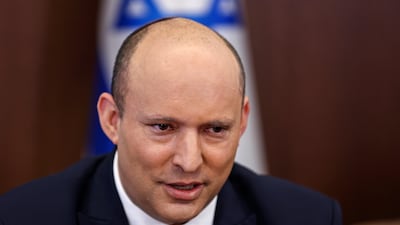Naftali Bennett convened what is likely to be his last Cabinet meeting as Israeli Prime Minister on Sunday.
Parliament is expected to dissolve itself this week, triggering an election in the autumn.
Mr Bennett’s decision to head to the polls puts an end to a political project that united eight ideologically disparate parties that chose to put aside their differences to oust former leader Benjamin Netanyahu, now opposition leader and who now has an opportunity to return to lead the country.
The election, the fifth the country has held in three years, signifies a deepening political crisis.
At the meeting, Mr Bennett listed a series of accomplishments under his year-long government and thanked his coalition partners, which included dovish parties that support Palestinian statehood, nationalist ones who do not, and for the first time in Israeli history, an Arab political faction.
“It was an excellent government that relied, yes, on a complicated coalition. And here in this room there is a group of people that knew how to put aside ideological disagreements, to rise above, and to work for the state of Israel,” he said.
As part of the power-sharing agreement that brought Mr Bennett to power, he is set to hand his responsibilities to Foreign Minister Yair Lapid, a centrist former broadcaster, once parliament is dissolved.
Elections are expected around the end of October and polls show Mr Netanyahu’s Likud party is expected to win the most seats.
But as in most rounds of voting during the current political turmoil, Mr Netanyahu, who is on trial for corruption, has been unable to muster a majority to form a coalition government, with some of his traditional allies refusing to join him. That could further extend the crisis after the coming vote.
While Mr Bennett’s government helped to steady the economy and navigated the last year of the coronavirus pandemic, it was beset by disagreements over the very issues it sought to avoid, particularly Israel’s 55-year occupation of the West Bank.
Mr Bennett said he decided to put an end to his political experiment because the government was unable to renew regulations that enshrine separate legal systems for Jewish settlers in the territory and Palestinians.
His nationalist faction, Yamina, was dogged by defectors, legislators who said the prime minister, a former settler leader, had veered too much towards the centre in his efforts to keep the coalition intact.
Mr Bennett, who entered politics a decade ago, has not said if he will run in the elections.
The%C2%A0specs%20
%3Cp%3E%3Cstrong%3EEngine%3A%3C%2Fstrong%3E%204-cylinder%202-litre%3Cbr%3E%3Cstrong%3ETransmission%3A%20%3C%2Fstrong%3E9-speed%20automatic%3Cbr%3E%3Cstrong%3EPower%3A%20%3C%2Fstrong%3E252%20brake%20horsepower%3Cbr%3E%3Cstrong%3ETorque%3A%20%3C%2Fstrong%3E352Nm%3Cbr%3E%3Cstrong%3EPrice%3A%20%3C%2Fstrong%3Efrom%20Dh146%2C700%3Cbr%3E%3Cstrong%3EOn%20sale%3A%20%3C%2Fstrong%3Enow%3C%2Fp%3E%0A
'Tell the Machine Goodnight' by Katie Williams
Penguin Randomhouse
Company Profile
Company name: OneOrder
Started: October 2021
Founders: Tamer Amer and Karim Maurice
Based: Cairo, Egypt
Industry: technology, logistics
Investors: A15 and self-funded
Wicked: For Good
Director: Jon M Chu
Starring: Ariana Grande, Cynthia Erivo, Jonathan Bailey, Jeff Goldblum, Michelle Yeoh, Ethan Slater
Rating: 4/5
Tightening the screw on rogue recruiters
The UAE overhauled the procedure to recruit housemaids and domestic workers with a law in 2017 to protect low-income labour from being exploited.
Only recruitment companies authorised by the government are permitted as part of Tadbeer, a network of labour ministry-regulated centres.
A contract must be drawn up for domestic workers, the wages and job offer clearly stating the nature of work.
The contract stating the wages, work entailed and accommodation must be sent to the employee in their home country before they depart for the UAE.
The contract will be signed by the employer and employee when the domestic worker arrives in the UAE.
Only recruitment agencies registered with the ministry can undertake recruitment and employment applications for domestic workers.
Penalties for illegal recruitment in the UAE include fines of up to Dh100,000 and imprisonment
But agents not authorised by the government sidestep the law by illegally getting women into the country on visit visas.
The%20specs%20
%3Cp%3E%3Cstrong%3EEngine%3A%20%3C%2Fstrong%3E2.0-litre%204cyl%20turbo%0D%3Cbr%3E%3Cstrong%3EPower%3A%20%3C%2Fstrong%3E261hp%20at%205%2C500rpm%0D%3Cbr%3E%3Cstrong%3ETorque%3A%20%3C%2Fstrong%3E400Nm%20at%201%2C750-4%2C000rpm%0D%3Cbr%3E%3Cstrong%3ETransmission%3A%20%3C%2Fstrong%3E7-speed%20dual-clutch%20auto%0D%3Cbr%3E%3Cstrong%3EFuel%20consumption%3A%20%3C%2Fstrong%3E10.5L%2F100km%0D%3Cbr%3E%3Cstrong%3EOn%20sale%3A%20%3C%2Fstrong%3ENow%0D%3Cbr%3E%3Cstrong%3EPrice%3A%20%3C%2Fstrong%3EFrom%20Dh129%2C999%20(VX%20Luxury)%3B%20from%20Dh149%2C999%20(VX%20Black%20Gold)%3C%2Fp%3E%0A
ICC Awards for 2021
MEN
Cricketer of the Year – Shaheen Afridi (Pakistan)
T20 Cricketer of the Year – Mohammad Rizwan (Pakistan)
ODI Cricketer of the Year – Babar Azam (Pakistan)
Test Cricketer of the Year – Joe Root (England)
WOMEN
Cricketer of the Year – Smriti Mandhana (India)
ODI Cricketer of the Year – Lizelle Lee (South Africa)
T20 Cricketer of the Year – Tammy Beaumont (England)
THE BIO
BIO:
Born in RAK on December 9, 1983
Lives in Abu Dhabi with her family
She graduated from Emirates University in 2007 with a BA in architectural engineering
Her motto in life is her grandmother’s saying “That who created you will not have you get lost”
Her ambition is to spread UAE’s culture of love and acceptance through serving coffee, the country’s traditional coffee in particular.
Genesis G80 2020 5.0-litre Royal Specs
Engine: 5-litre V8
Gearbox: eight-speed automatic
Power: 420hp
Torque: 505Nm
Fuel economy, combined: 12.4L/100km
Price: Dh260,500
The biog
Simon Nadim has completed 7,000 dives.
The hardest dive in the UAE is the German U-boat 110m down off the Fujairah coast.
As a child, he loved the documentaries of Jacques Cousteau
He also led a team that discovered the long-lost portion of the Ines oil tanker.
If you are interested in diving, he runs the XR Hub Dive Centre in Fujairah
UAE currency: the story behind the money in your pockets


